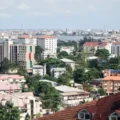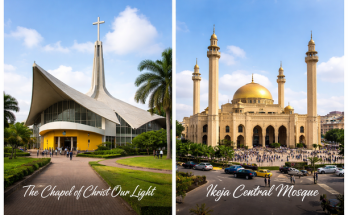By Sunkanmi Adewunmi
A new study warns that cutting smog could speed up global warming. Removing reflective aerosols from vehicles and power plants exposes hidden heat, causing the Earth’s surface to warm faster. For Lagos, a humid city of about 15 million, this could mean hotter summers and more extreme weather.
Atmospheric chemist Dr. Olayemi Temitope notes that air pollution and climate change are “two sides of the same coin.” Dust and soot not only harm health but also affect greenhouse gases like methane. He urges Lagos to pair cleaner air efforts with strong climate action to prevent worsening heat.
Lagosians Bear the Heat
Lagosians are already feeling the heat. In April 2024, the city endured one of its worst heatwaves, which many link to climate change. Auditor Tosin Abiodun told mentioned “no one can remember the heat being as severe,” saying she copes by taking multiple showers and wearing light clothes. Delivery driver, Afolabi added that “this heat makes matters even worse” on Lagos’s congested roads.
Experts warn the heat will keep rising. Retired climatologist Prof. Emmanuel Oladipo says “heat waves are now a reality in Nigeria” and urges better housing design, natural ventilation, and reliable electricity to reduce heat stress. Farmers like Yunusa Halidu of the All Farmers Association agree the “heat is extreme this year” and blame global warming, but without reliable cooling or warning systems, many communities remain unprotected.
Coping on the Ground
Lagos’s poorest are hit hardest. Millions live in crowded neighborhoods with little shade or running water. As climate writer Nelson Odume points out, Lagos’s climate is changing: overall rainfall is slightly falling, but downpours are becoming more intense. In practice, this means longer dry spells punctuated by severe floods. Coastal Lagos will also face higher storm surges as sea levels rise. But right now, the urgent problem for many is heat.
Residents have adopted desperate ways to cope with the heat. Many focus on hydration and simple cooling methods. “I drink plenty of water and bathe several times a day,” says Amina, who also carries hand fans and uses battery-powered ones when power fails. Olufunke keeps water in her bag, wears sunglasses, sleeps on tiled floors, and bathes before dawn to stay cool. Even livestock seek shade under trees.
Children, the elderly, and outdoor workers stay indoors during peak hours, while communities share health tips via radio and WhatsApp. Still, experts warn that without reliable power and affordable cooling, heatwaves will remain a serious public health threat.
Looking Ahead: Adapting Lagos
Lagos isn’t powerless. The state is developing climate plans and investing in adaptation, from planting trees and improving drainage to promoting “cool roofs.” Experts urge flood-resistant infrastructure, better ventilation, and reflective housing designs to reduce indoor heat.
At a national level, scientists like Dr. Temitope call for stronger air-quality monitoring, warning that “you can’t fix what you don’t measure.” Clean air and climate action must go together to track pollution, protect residents, and expand green spaces.
Cleaner air will also bring more heat. With rising temperatures and extreme weather ahead, Lagos must act fast through shading, hydration, stronger power grids, and greener infrastructure. As one expert says, “Clean air is not a luxury; it’s essential.”








